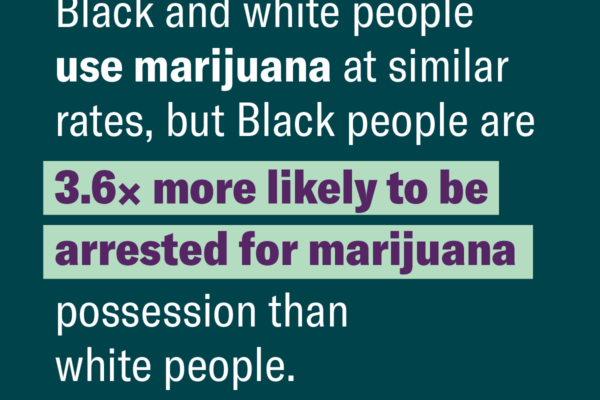OKLAHOMA CITY – Today the American Civil Liberties Union released a new report that showed Black people are 4.2 times more likely than white people to be arrested for marijuana possession in Oklahoma, despite comparable national marijuana usage rates. Nationally, Blacks were 3.64 times more likely to be arrested than whites. Although the total number of people arrested for marijuana possession has decreased in the past decade, nationally, law enforcement still made 6.1 million such arrests over that period, and the racial disparities in arrest rates remain in every state.
The report, A Tale of Two Countries: Racially Targeted Arrests in the Era of Marijuana Reform, details marijuana possession arrests from 2010 to 2018 and updates our unprecedented national report published in 2013, The War on Marijuana in Black and White. The disturbing findings of this new research show that despite Oklahoma having reformed marijuana policy over the last decade, far too much has remained unchanged when it comes to racial disparities in arrests. Key findings include:
- Across the U.S., law enforcement made more than 6.1 million marijuana-related arrests from 2010 to 2018. In Oklahoma alone, there were almost 9,057 marijuana arrests in 2018, the vast majority of which were for possession. In 2018, marijuana possession arrests accounted for 42 percent of all drug arrests in Oklahoma.
- Despite legalization in a number of states, it is not clear that marijuana arrests are trending downward nationally. National arrest rates have actually risen in the past few years, with almost 100,000 more arrests in 2018 than 2015.
- A Black person in Oklahoma is 4.2 times more likely to be arrested for marijuana possession than a white person. In fact, Oklahoma ranks 13 in the nation for the largest racial disparities in marijuana possession arrests.
- Although the overwhelming majority of Oklahoma counties have racial disparities, Pontotoc, Ottawa, Rogers, Cherokee, and Stephens have the largest disparities in marijuana arrests.
- Overall, these disparities have not improved. Nationally, a Black person is 3.64 times more likely to be arrested for marijuana possession than a white person, even though Black and white people use marijuana at similar rates. In ten states, Blacks were more than 5 times more likely to be arrested.
- Overall, in states that legalized marijuana, arrest rates decreased after legalization while racial disparities remained.
A Tale of Two Countries: Racially Targeted Arrests in the Era of Marijuana Reform comes at a time when the criminal legal system is overwhelmed by the COVID-19 public health crisis that demands expedited decarcercal action to safeguard the lives of those incarcerated in and employed by jails and prisons. The reforms recommended in this report provide a road map for reducing marijuana arrests and criminalization as governors, prosecutors, judges, and other stakeholders across the country grapple with the harms presented by the public health crisis and take steps to release people from jails and prisons.
“Oklahoma continues to vigorously enforce marijuana laws, which disproportionately target Black communities and entangle hundreds of thousands of people in the criminal legal system every year at a tremendous cost,” says Ryan Kiesel, Executive Director for the ACLU of Oklahoma. “As a matter of racial justice and sound public health policy, every state in the country must legalize marijuana with racial equity at the foundation of such reform.”
To combat the racial disparities rampant in marijuana-related arrests, the ACLU of Oklahoma is calling not only for an end to racialized policing but also for full legalization of marijuana use and possession combined with specific measures to ensure legalization efforts are grounded in racial justice. This includes pressing for passage of the MORE Act, which aims to correct historical injustices of the failed War on Drugs that has terrorized Black communities and decriminalizes marijuana at the federal level, reassesses marijuana convictions, and invests in economically disadvantaged communities.

